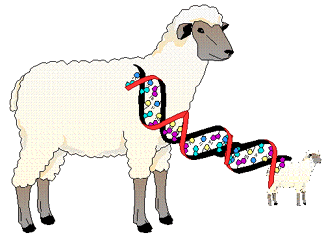 If you think of futuristic discoveries, the idea of cloning yourself must come to mind. What if I had another person exactly like me roaming around on the earth? Although many people might think this, few people actually know what genetic cloning is. Genetic cloning is the creation of an organism that is an exact genetic copy of another, meaning that they have the same genetic makeup. Cloning is also an asexual form of reproduction, meaning that the offspring comes from one parent rather than the normal (for humans) two. In humans, and mammals in general, this idea of asexual reproduction is unnatural, so it must be done forcefully and unnaturally. There are many ways to go about this, but the most known is Somatic Cell Nuclear Transfer (SCNC). This procedure creates an exact clone or genetic copy of an individual. A somatic cell is any cell in the body other than reproductive cells. The difference between reproductive cells and somatic cells is that somatic cells have two complete sets of chromosomes, while reproductive cells only have one (awaiting for the other pair to make offspring). A SCNC takes the nucleus of a somatic cell (containing all of the DNA in that individual) and places it in an empty egg cell. This creates a fertilized egg. Once the egg has created an embryo (in a petri dish), it will be placed into a surrogate mother until ready for birth. Once this organism is developed, it is a clone of the individual who donated the somatic cell!
If you think of futuristic discoveries, the idea of cloning yourself must come to mind. What if I had another person exactly like me roaming around on the earth? Although many people might think this, few people actually know what genetic cloning is. Genetic cloning is the creation of an organism that is an exact genetic copy of another, meaning that they have the same genetic makeup. Cloning is also an asexual form of reproduction, meaning that the offspring comes from one parent rather than the normal (for humans) two. In humans, and mammals in general, this idea of asexual reproduction is unnatural, so it must be done forcefully and unnaturally. There are many ways to go about this, but the most known is Somatic Cell Nuclear Transfer (SCNC). This procedure creates an exact clone or genetic copy of an individual. A somatic cell is any cell in the body other than reproductive cells. The difference between reproductive cells and somatic cells is that somatic cells have two complete sets of chromosomes, while reproductive cells only have one (awaiting for the other pair to make offspring). A SCNC takes the nucleus of a somatic cell (containing all of the DNA in that individual) and places it in an empty egg cell. This creates a fertilized egg. Once the egg has created an embryo (in a petri dish), it will be placed into a surrogate mother until ready for birth. Once this organism is developed, it is a clone of the individual who donated the somatic cell!This process is both new in the science field and greatly debated. Although few mammals have been successfully cloned, the first being Dolly in 1997, the topic of cloning animals, and humans is greatly debated. The pros of this cloning is that is creates no need for reproduction, you can just clone yourself, and if you have a good immune/health system, cloning yourself could create "the perfect race". This would be great because disease numbers would go down (almost to non-existant) and life expectancies would rise drastically. Also, if we were to clone plants and animals, we could have perfectly balanced food all of the time. The cons for cloning are also a good side. If the human race were to constantly clone DNA, it would lessen the diversity in genes, which would not allow the human race, and other animals/plants to stop adapting. This would be terrible for everyone, because adaption is necessary in life.
In a recent study, it shows that it is possible to take fossils of extinct species and clone them, making them not extinct anymore. This is done by taking things such as bones from a museum, ancient hair and other cellular items and doing a Somatic Cell Nuclear Transfer with them, and then putting them in a surrogate similar to the species itself. This idea, although completely remarkable, brings up serious problems. If extinct animals were to come back, such as mammoths and dinosaurs, it would seriously disrupt the ecosystem already strained today. With a "new" organism fighting for food comes, the ecosystem is greatly altered, changing the way of life for many animals. http://www.cbsnews.com/stories/2010/01/07/60minutes/main6067594.shtml
Genetic cloning is a remarkable study, and seems only used in fiction novels. This is real, and has potential to change the way of life itself completely.
Sources:
- http://www.arhp.org/publications-and-resources/patient-resources/printed-materials/cloning
- http://learn.genetics.utah.edu/content/tech/cloning/whatiscloning/
